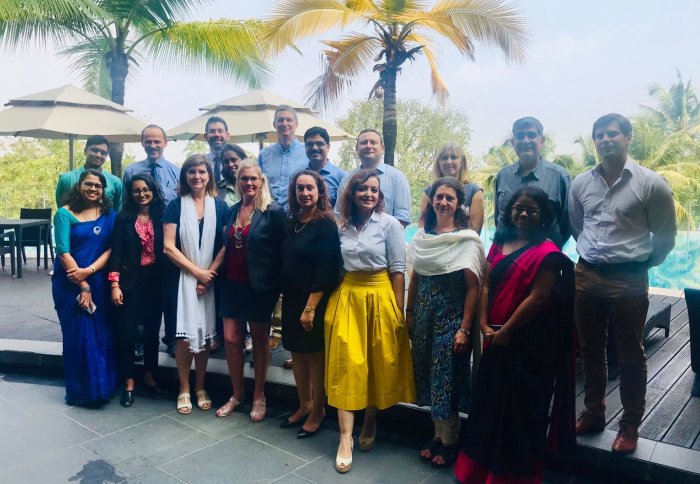International collaborative networks to optimise infection related outcomes

Building collaborative networks and capacity to optimise infection related outcomes in surgical pathways
The “Optimising antibiotic use along surgical pathways: addressing antimicrobial resistance and improving clinical outcomes" project held its first international research symposium, entitled “Surgery, Infection and Antimicrobials: A Global Challenge - Antibiotic use and infection management across Surgical Pathways - Investigating, Redesigning and Evaluating Systems (ASPIRES)” in India, on 25th -26th October 2018.
The large-scale collaborative grant has been awarded within Theme 4 of the cross-Research Council initiative on Antimicrobial Resistance (AMR) ‘Tackling AMR: behaviour within and beyond the healthcare setting’ and is funded by the Economic and Social Research Council with the support of the Global Challenges Research Fund. It brings together Imperial College London’s Faculty of Medicine (Professor Alison Holmes, Dr Raheelah Ahmad, Dr Esmita Charani, Dr Enrique Castro-Sánchez, Dr Gabriel Birgand) and the Business School (represented by Professor Franco Sassi), with experts from King’s College London (Mr Andy Leather, Professor Nick Sevdalis, Professor Ewan Ferlie), University of Leicester (Dr Carolyn Tarrant), University of Hertfordshire (Dr Reda Lebcir), Royal College of Anaesthetists (Dr Ramani Moonesinghe), University of Cape Town, South Africa (Professor Marc Mendelson, Dr Mark Hampton), Amrita Institute of Medical Sciences, India (Dr Sanjeev Singh, Dr Puneet Dhar) and University Teaching Hospital of Butare, Rwanda (Dr Jules Ndoli Minega, Dr Christian Ngarambe) to tackle the global problem of AMR in surgical pathways. AMR is a major driver of poor surgical outcomes and there is an urgent need to understand how to minimise the burden of infection and optimise antibiotic use in surgical settings. (Also Ref: Charani E, Ahmad R, Rawson T, Castro-Sanchez E, Tarrant C, Holmes A. The differences in antibiotic decision-making between acute surgical and acute medical teams – an ethnographic study of culture and team dynamics. Clin Infect Dis. In press.) ASPIRES aims to address key drivers of AMR by developing context-relevant solutions to reduce the risk of infection and optimise the use of antibiotics, coupled with tailored implementation strategies, along the entire surgical pathway.
The symposium, held in Kerala and co-organised by Imperial and Amrita focused on how the ASPIRES project fits with the global agenda for addressing AMR. Session topics included “Health System Level Factors influencing antimicrobial resistance and infection prevention and control in the Surgical Pathway”, “The contribution of social science research to improving antibiotic use and infection prevention and control behaviours in the surgical pathway” and “Intervention design and implementation across surgical pathways”, with presentations from India, South Africa and the UK. The project’s patient representative, Vanessa Carter from South Africa, also presented on “Mapping out the patient journey to identify potential improvements in surgical pathways”. The symposium was an opportunity for sharing emerging findings and particularly identifying opportunities for South-South learning between India, South Africa and Rwanda. Engagement of the entire research team with healthcare staff at Amrita (including anaesthetists, surgeons, patient representatives, pharmacists and nurses) provided the possibility for consolidating the research and developing further opportunities for collaboration and learning.
This project builds research capacity at Amrita with four full-time locally recruited researchers with anthropology, pharmacy and quantitative backgrounds. This next generation of researchers (Dr Vrinda Nampoothiri, Surya Surendran, and Pranav V) gave updates on their development and learning and contributions to the project to date. They, together with the recruited researchers to the project in South Africa, will be in London early in the New Year at the “Social Science Research Methodologies workshop: tackling Antimicrobial Resistance”, co-hosted by two projects funded in this call: ASPIRES and STEP-UP (Improving the uptake and Sustainability of Effective interventions to promote Prudent antibiotic Use in Primary care).
The second day of the meetings had all parties visit the Amrita Hospital facilities, allowing the participants to understand the challenges of AMR on-the-ground, and interact with researchers, healthcare workers, and policy-makers addressing AMR in India.
The ASPIRES meetings coincided with Kerala’s launch of a state-level action plan for containing AMR, which recognised the efforts of the ASPIRES India country lead Dr Sanjeev Singh to implement antimicrobial stewardship across the state. Members of ASPIRES also had the opportunity to have a round table meeting with the State Chief Secretary for Health, Dr Arjun Srinivasan. Kerala is the first state in India to develop a state-level action plan, adopting a one-health approach from the outset through a collaborative exercise involving the health and environment sectors. As one of the world’s biggest consumers of antibiotics, the global importance of tackling AMR in India is critical.

The ASPIRES meeting instigated a two-day International Conference on Antibiotic Stewardship and Infectious Diseases “No action today, no cure tomorrow”. International faculty included ASPIRES researchers Professor Alison Holmes, Dr Esmita Charani, Dr Enrique Castro-Sánchez, Dr Ramani Moonesinghe, Dr Nick Sevdalis, Dr Carolyn Tarrant and Dr Mark Hampton. This meeting was interdisciplinary, with participation from surgical, anaesthesia, nursing, pharmacy and medical professions all engaging in dialogue on infection prevention and control and antimicrobial stewardship.
ASPIRES is planning the next country meeting in South Africa in October/November 2019 to broaden the capacity of work already undertaken as well as share learnings from the second year of this exciting project.
Article supporters
Article text (excluding photos or graphics) © Imperial College London.
Photos and graphics subject to third party copyright used with permission or © Imperial College London.
Reporter
Anna Skordai
Department of Infectious Disease
Sara Yadav
Department of Infectious Disease
Dr Esmita Charani, PhD MSc MPharm, ESCMID Fellow
Department of Infectious Disease
Raheelah Ahmad
Department of Infectious Disease